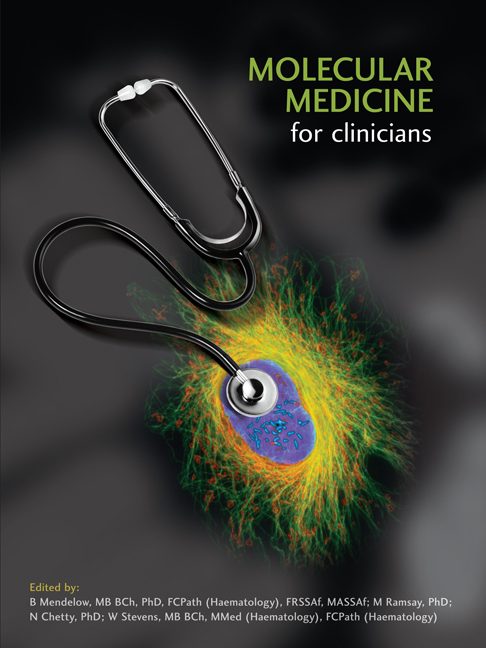Book contents
- Frontmatter
- Contents
- Foreword
- Acknowledgements
- Chapter 1 Introduction
- Keynote Essay 1: Defining Who We Are: DNA in Forensics, Genealogy and Human Origins
- Section 1 Principles Of Cellular And Molecular Biology
- SECTION 2 MOLECULAR PATHOLOGY
- Chapter 8 Genomes and the Environment: An Overview of Molecular Pathology
- Chapter 9 Genetics, Genomics, Health and Disease: General Considerations
- Chapter 10 Chromosome Disorders
- Chapter 11 Mendelian Inheritance
- Chapter 12 Unusual Molecular Processes that Impact on Disease
- Chapter 13 Population Genetics
- Chapter 14 Complex Multifactorial Inheritance
- Chapter 15 Molecular Basis for Phenotypic Variation
- Chapter 16 Medical Genetics
- Keynote Essay 3: Human Cloning: Should We Go There?
- Chapter 17 Neoplasia: General Considerations
- Chapter 18 Oncogenes
- Chapter 19 Mammalian DNA Repair
- Chapter 20 Tumour Suppressor Genes and Inherited Susceptibility to Cancer
- Chapter 21 Carcinoma
- Chapter 22 Leukaemias and Lymphomas
- Chapter 23 Molecular Approaches to the Diagnosis, Prognostication and Monitoring of Cancer
- Keynote Essay 4: Microbes, Molecules, Maladies and Man
- Chapter 24 Molecular Basis of Infectious Diseases: General Considerations
- Chapter 25 Immunology
- Chapter 26 Human Immunodeficiency Virus
- Chapter 27 Tuberculosis
- Chapter 28 Malaria
- Chapter 29 Influenza
- Chapter 30 Oncogenic Viruses
- Chapter 31 Vaccines and Immunisation
- Keynote Essay 5: Drugs and the 21st Century
- SECTION 3 MOLECULAR THERAPEUTICS
- SECTION 4 RESEARCH AND THE CONTINUING EVOLUTION OF MOLECULAR MEDICINE
- Glossary
- Contributors’ Biographies
- Source Material And Recommended Reading
- Permissions And Credits
- Index
Chapter 23 - Molecular Approaches to the Diagnosis, Prognostication and Monitoring of Cancer
from SECTION 2 - MOLECULAR PATHOLOGY
Published online by Cambridge University Press: 04 June 2019
- Frontmatter
- Contents
- Foreword
- Acknowledgements
- Chapter 1 Introduction
- Keynote Essay 1: Defining Who We Are: DNA in Forensics, Genealogy and Human Origins
- Section 1 Principles Of Cellular And Molecular Biology
- SECTION 2 MOLECULAR PATHOLOGY
- Chapter 8 Genomes and the Environment: An Overview of Molecular Pathology
- Chapter 9 Genetics, Genomics, Health and Disease: General Considerations
- Chapter 10 Chromosome Disorders
- Chapter 11 Mendelian Inheritance
- Chapter 12 Unusual Molecular Processes that Impact on Disease
- Chapter 13 Population Genetics
- Chapter 14 Complex Multifactorial Inheritance
- Chapter 15 Molecular Basis for Phenotypic Variation
- Chapter 16 Medical Genetics
- Keynote Essay 3: Human Cloning: Should We Go There?
- Chapter 17 Neoplasia: General Considerations
- Chapter 18 Oncogenes
- Chapter 19 Mammalian DNA Repair
- Chapter 20 Tumour Suppressor Genes and Inherited Susceptibility to Cancer
- Chapter 21 Carcinoma
- Chapter 22 Leukaemias and Lymphomas
- Chapter 23 Molecular Approaches to the Diagnosis, Prognostication and Monitoring of Cancer
- Keynote Essay 4: Microbes, Molecules, Maladies and Man
- Chapter 24 Molecular Basis of Infectious Diseases: General Considerations
- Chapter 25 Immunology
- Chapter 26 Human Immunodeficiency Virus
- Chapter 27 Tuberculosis
- Chapter 28 Malaria
- Chapter 29 Influenza
- Chapter 30 Oncogenic Viruses
- Chapter 31 Vaccines and Immunisation
- Keynote Essay 5: Drugs and the 21st Century
- SECTION 3 MOLECULAR THERAPEUTICS
- SECTION 4 RESEARCH AND THE CONTINUING EVOLUTION OF MOLECULAR MEDICINE
- Glossary
- Contributors’ Biographies
- Source Material And Recommended Reading
- Permissions And Credits
- Index
Summary
INTRODUCTION
Significant advances in genomics, proteomics and molecular pathology in general have generated a wealth of new approaches in diagnosis, monitoring, understanding the pathogenesis of disease and identifying new therapeutic targets. Sequencing of the human genome and other recent high-volume data discovery approaches have become a reality as a result of expanding information techno logy and the automation of instrumentation. The drivers of the human genome project are now focusing on characterising disease processes at the DNA, RNA and protein level. As these technologies enter the clinical environment, the challenge is the interpretation of these complex data to derive clinically useful information. A comprehensive discussion of new molecular biomarkers is beyond the scope of this chapter and therefore some of the highlights that will undoubtedly change cancer diagnosis in modern times will be illustrated.
By way of introduction, tumours are clonal which means they originate from a single cell. This cell may acquire a number of mutations and/or epigenetic changes that influence cellular pathways and processes. Some of the properties ascribed to tumours include unrestricted replication, failure to respond to anti-growth signals, inability to undergo apoptosis, ongoing angiogenesis and tissue invasion and metastasis. This model of tumour development is often refer red to as the multistage model of carcinogenesis. An example that clearly illustrates this process occurs in the setting of colon cancer: there is progression from normal colonic epithelium to dysplasia of epithelial cells leading to the formation of an adenomatous polyp or benign tumour of colonic epithelium. From this arises an invasive adenocarcinoma that can ultimately metastasise. Each stage is characterised by an additional set of genetic alterations. Understanding the under - lying mechanisms of development of neoplasia is critical to identify targets that may be important for screening, diagnosis and monitoring of tumours.
There are two broad groups of cancer critical genes that have been described elsewhere in this textbook, the oncogenes and the tumour suppressor genes. This is, however, a rapidly evolving field as has been demonstrated by the recent identification of small non-coding RNAs called microRNAs that negatively regulate the expression of many genes. Their altered expression has been recently linked to carcinogenesis.
- Type
- Chapter
- Information
- Molecular Medicine for Clinicians , pp. 271 - 276Publisher: Wits University PressPrint publication year: 2008



